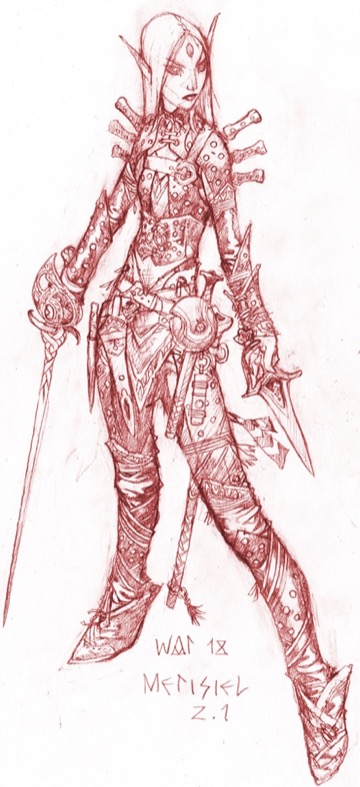Are you plagued by a friend and coworker who peppers his blogs with puns and ridiculous word plays, often dessert-based? Does it bother you so much that you fantasize about stabbing him in the back, but federal and local statutes (along with those pesky pangs of morality) stop you? Well, I have good news! You can play a rogue and take out your frustrations on your friend's monsters!
Last week, Jason presented a preview of the Pathfinder Second Edition fighter class, giving you a peek into our process when designing classes for the new game. This week, I am happy to present the fighter's favorite combat companion—the rogue!
The design goals for the rogue were simple: she had to be nimble, skillful, and able to take full advantage when enemies are unaware. The new class design achieves this through a mix of classic and new mechanics.
Rogue Features
I'm sure it will surprise no one that the first class feature the rogue gets is sneak attack. It works much like you would expect, granting extra d6s of precision damage when she strikes a flat-footed foe. Flanking a foe is the easiest way for the rogue to make her foe flat-footed, but at 1st level, she also gets the surprise attack feature. Thanks to surprise attack, during the first round of combat, the rogue treats any creature that has not taken its turn yet as if it were flat-footed.
But wait, there's more! In addition to dealing extra damage when attacking flat-footed foes, at 9th level the rogue also applies debilitating strikes to such attacks, allowing her to entangle or enfeeble her foes on top of the normal punishment. As her level rises, she has the opportunity to expand the conditions applied with debilitating strikes and increase the number of conditions applied, leading up to a potential instant kill with her Master Strike at 19th level.
So, the rogue is a ruthless combatant bringing pain and misery to her foes, but that's only half of the story. She is also a master of skills. Not only does she gain training and proficiency increases in more skills than other classes, but she gains skill feats at an accelerated rate (one per level instead of one every other level). And while Deception, Stealth, and Thievery and all of the skill feats attached to those iconic rogue skills may seem like obvious choices, the rogue's mastery of a wide variety of skills makes her one of the most versatile classes in the game—her breadth of knowledge and abilities means she's extremely useful in every mode of play.
If you want to play a dungeon-delving rogue, stock up on skill feats expanding on Acrobatics, Athletics, Stealth, and Deception to gain skill feats that let you do things like kip up from prone for free, jump from wall to wall, and move stealthily at full speed. If you want to be a savvy con artist bilking the rich and vain, focus on Deception, Diplomacy, Performance, and Society. If you want to play a fence or burglar with a semblance of respectability, focus on Crafting, Intimidation, and the like. Your options are so rich that you can easily create a mix of these types of rogues and many further variations.
Rogue Feats
Bridging the gap between the murderous and the skillful are the various class feats available to the rogue. The few of you lucky enough to playtest the rogue at Gary Con X or the GAMA Trade Show became acquainted with Nimble Dodge, a reaction that increases the rogue's Armor Class by 2 at a whim. And that's pretty cool, but the rogue's tricks don't stop there. At 2nd level, a rogue could take Mobility, allowing her to move at half her speed and ignore all sorts of reactions triggered by movement, such as attacks of opportunity. And at 4th level, there's a rogue feat called Reactive Pursuit, which allows the rogue—as a reaction—to chase after foes trying to disengage from her constant stabbings.
Avoiding attacks and getting into position are all fine and dandy, but occasionally rogues have a hard time lining up flanking. The 4th-level feat Dread Striker allows you to treat frightened creatures as flat-footed, which is pretty good, but if you want even greater flexibility for positioning, check out Gang Up at 6th level. That feat allows you to treat an enemy as flat-footed when it's within the melee reach of you and one of your allies, no matter your positioning. If that's not good enough, wait until 14th level, when you can take Instant Opening—with a few choice words or a rude gesture, you can make a single creature within 30 feet flat-footed to your attacks until the end of your next turn.
Rogues are slippery characters, both physically and mentally. Cognitive Loophole lets the rogue ignore a mental effect for a round before it fully takes hold. At 16th level, a rogue can parlay her proficiency in Deception to become a Blank Slate, which makes her immune to detection, revelation, and scrying effects.
Of course, many of the rogue's class feats also increase her fighting potential. One of my favorites is the 6th-level feat Twist the Knife. With this feat, as long as you have just hit a foe and applied your sneak attack damage, you can apply persistent bleed damage equal to half your current sneak attack dice. That's sure going to leave a mark.
All this has only scratched the surface of the rogue. In the end, this class is a toolbox of tricks, cunning, and mayhem, adaptable to a variety of situations in and out of combat. Its design allows you to focus on the kind of rogue you want to play, from a ruthless slayer who infiltrates dungeons to a swindler charming away coin from gullible townsfolk, or even a hard-boiled hunter of fugitives. It's up to you!
Stephen Radney-MacFarland
Senior Designer













